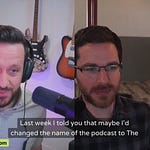I recently sat down with Bret for a special joint episode of the Dark Horse podcast and the Digger. We met at an event by the World Council for Health and had the chance to dive deep into some pressing topics. It had been two years since our last face-to-face at the Better Way conference, where the energy and camaraderie were palpable.
We kicked off our discussion with Bret's talk from the previous night, titled "Dark Age or Enlightenment: The Hyper-novelty Crisis." Bret posed a provocative question: Are we entering a new Dark Age, or leaving one behind for a new Age of Enlightenment? This question split the room and set the stage for our conversation.
Bret reflected on his evolving perspective, influenced by his encounter with Steve Patterson, who believes our current Dark Age began in the 1920s. Bret suggests that a Dark Age doesn't blanket civilization all at once but creeps in field by field. He identified 1976 as a pivotal year for his own field's decline.
We discussed the systemic issues holding back progress, including the shift from Enlightenment-era discovery to career-driven science, which Bret argues has become highly corruptible. He critiqued the modern university system's reliance on grant funding and student labor, distorting academic priorities.
One highlight was Bret's analogy comparing science to nuclear fusion: powerful but hard to sustain under current conditions. We also tackled the influence of moral imperatives on scientific fields, particularly climate science, and the dangers of blending moral objectives with empirical inquiry.
Towards the end, we explored the concept of a hyper-novelty crisis, where rapid technological change outpaces our cultural and psychological adaptation. Despite the dark outlook, Bret remained cautiously optimistic, stressing the importance of recognizing our current disorientation to find a way forward.
This conversation was a blend of critical insights and hopeful solutions. If you're curious about where our world is headed and how we might navigate these challenges, this podcast episode is a must-watch. Join us for an engaging and thought-provoking discussion.
Comments open, and shares very much appreciated. The audience I get is the audience you create. As ever, if you liked the show please support with a paid subscription.










